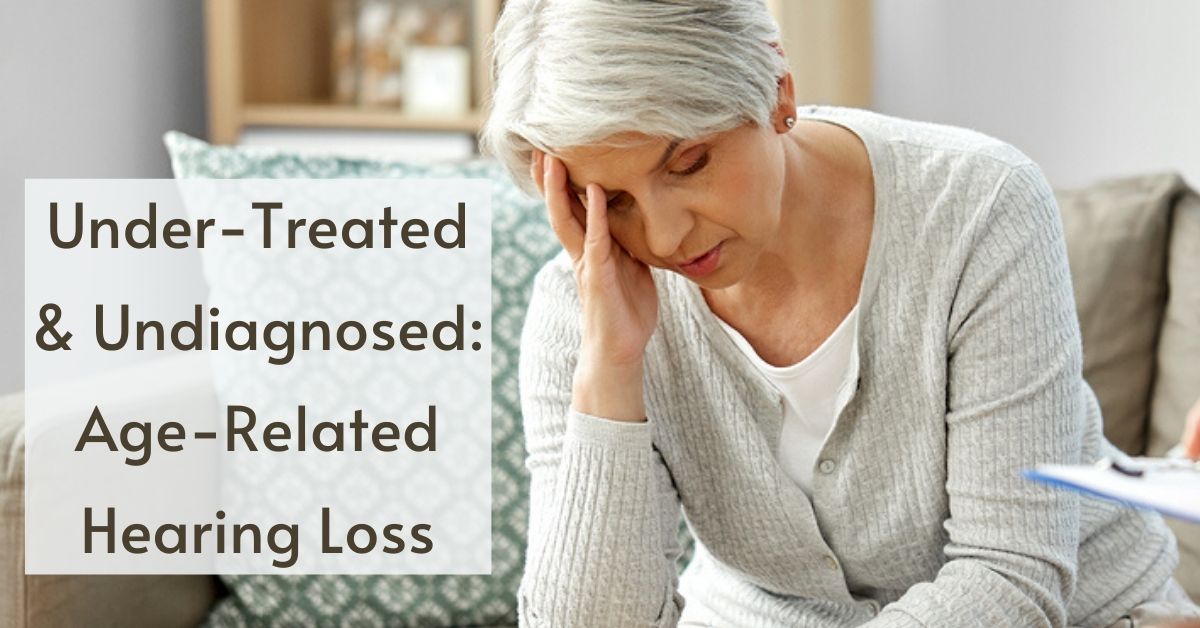
Hearing loss is the third most common health condition among aging adults. Age related hearing loss is the gradual impairment, or reduced ability, to hear over time. Though it is prevalent, impaired hearing can easily be ignored and untreated. This is particularly impactful for older adults whose health is more at risk. It is important to be aware of the pervasiveness of hearing loss, the impact, and how to effectively address it!
Age-Related Hearing Loss
A variety of factors can contribute to the development of hearing loss: existing medical conditions, environmental exposure to loud noise, and genetic history. Though hearing loss is not an inevitable reality of the aging process, there is a strong link between age and impaired hearing. According to the National Institute on Deafness and Other Communication Disorders (NIDCD), age is a strong predictor with the following rates of hearing loss in the United States:
- Ages 45 to 54: 2%
- Ages 55 to 64: 8.5%
- Ages 65 to 74: 25%
- Ages 75 and older: 50%
These striking statistics reveal not only that hearing loss is a prevalent health concern but that the risk increases throughout the aging process. This could be a result of:
- Changes to the ear that happen gradually: that can impact the small bones in the middle ear or the eardrum. Both of these ear components are critical in amplifying and pushing soundwaves further into the inner ear.
- Other medical conditions: such as high blood pressure, diabetes, and stroke are health issues that become greater risks with age and can contribute to hearing loss.
- Exposure to loud noise: over time can damage the hair cells in the cochlea. These hair cells help translate soundwaves into electrical impulses that are sent to the brain to process. Damage to hair cells makes this challenging and is permanent (these cells do not regenerate).
Undertreated & Undiagnosed
Though hearing loss is prevalent among aging adults, it can easily be overlooked and untreated. Because hearing loss often happens slowly over time, people may not realize that they are in fact experiencing it. There are millions of people who have not addressed their hearing loss, the NIDCD cites that:
- Nearly 30 million adults could benefit from using hearing aids
- Less than 30% of adults age 70 and older with hearing loss use hearing aids
- Less 16% of adults age 20 to 69 with hearing loss use hearing aids
- This illustrates the scope of untreated hearing loss which is particularly concerning for aging adults.
Impact
An already vulnerable population, older adults experience higher risks to their health. Undiagnosed hearing loss can be profoundly impactful. It can:
- Strain Communication: people often experience difficulty following conversations, hearing distinct words, speech and sounds are muffled, frequently need others to repeat themselves or speak loudly, move to quieter areas to be able to hear etc. This is can be stressful and frustrate everyone involved in the conversation.
- Lead to Social Withdrawal: interacting with others can become more work than pleasure. People with hearing loss often have to use extra energy in trying to hear better which is exhausting. This can lead to avoiding social gatherings, environments with background noise, and spending less time with family and friends.
- Harmful to Overall Health: fatigue and isolation prevent people from participating in activities and engaging with others. This can contribute to depression, anxiety, and loneliness which can take a toll on mental and emotional health.
Untreated hearing loss can worsen the impairment as well as these conditions. This impacts how a person is able to navigate on a daily basis. This is particularly concerning for older adults who may be receiving care and relying on others.
Treatment
The first step in addressing hearing loss is having your hearing assessed. A non-invasive and relatively quick process, a hearing test determines any impairment, the severity, and specific type. This information will be shared with you during this appointment with a hearing healthcare specialist who will also discuss the most effective treatment options. Hearing loss is most commonly treated with hearing aids. Hearing aids are small electronic devices that work to absorb, amplify, and process sound. This allows people to hear sounds and speech they haven’t heard in some time and hear clearly. An increased ability to hear in all environments can truly be life changing!
